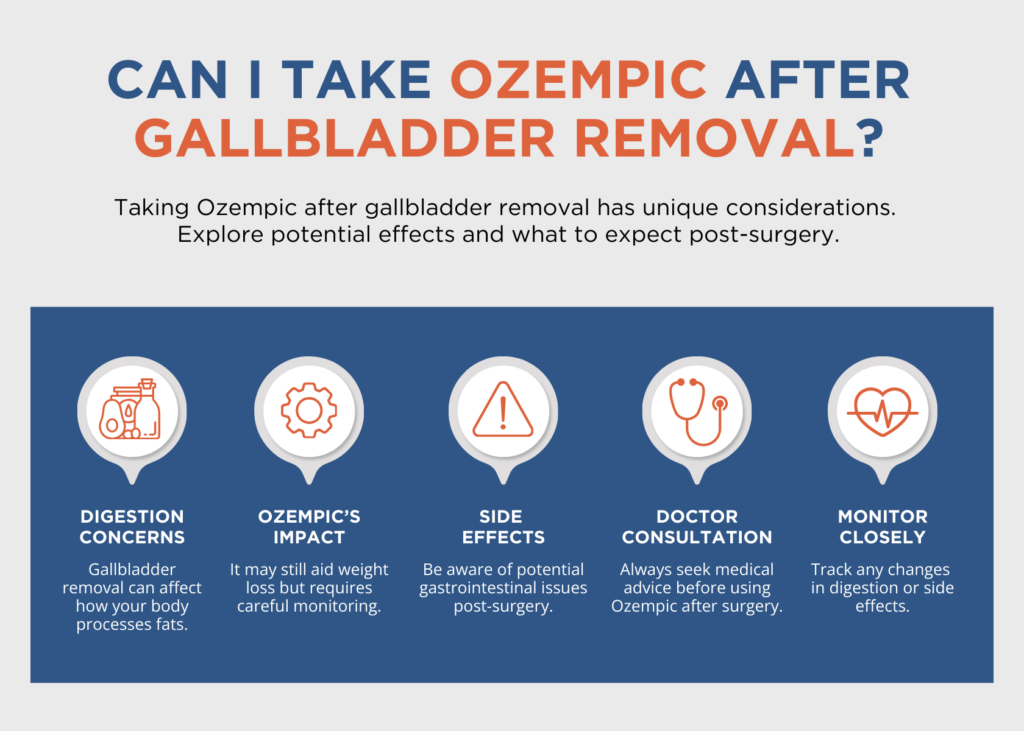Navigating Ozempic Use After Gallbladder Surgery
Ozempic, Wegovy, and similar medications have become enticing options for people who have struggled to lose weight on their own. As they’ve skyrocketed in popularity and more people entertain the idea of seeking a prescription, more questions begin to come up for unique situations, like, can you take Ozempic without a gallbladder?
For many, Ozempic has become a go-to solution for weight loss, but if you’ve had your gallbladder removed or are going to have it removed, you may have additional questions and concerns. This guide covers questions about taking Ozempic after gallbladder removal, what you should expect, and how to maximize your results.
What Is Ozempic?
Ozempic is a medication for type 2 diabetes that uses the active ingredient semaglutide. Semaglutide is a type of glucagon peptide-1 (GLP-1) agonist, which means that it mimics the GLP-1 hormone in the body. By mimicking this hormone, Ozempic can signal to the brain that you’re full.
As a result, Ozempic reduces appetite and slows stomach emptying, making you less likely to overeat and helping you reduce your daily calorie intake. Although Ozempic was originally developed for type-2 diabetes to help lower blood sugar levels, it was also found to have benefits for weight loss, which caused it to jump in popularity.
At this point, millions of people in the US alone take semaglutide medications like Ozempic and Wegovy. Just like any medication, though, it’s important to be conscious of the potential drawbacks, as everyone responds differently and may have different results or side effects.
What Does the Gallbladder Do?
The gallbladder is a small organ next to the liver responsible for storing and releasing a substance called bile, a liquid produced by the liver that aids in digesting fat. As we eat more fat, the gallbladder releases bile into the small intestine.
Gallbladder removal, also called a cholecystectomy, involves a complete removal of the organ. The most common procedure is called a laparoscopic cholecystectomy, which involves a small incision for a quicker, less invasive process. A doctor will likely recommend this procedure for people suffering from inflammation or gallstones, which are deposits that harden in the gallbladder and can block the flow of bile.
However, the gallbladder is not necessary for survival. After having your gallbladder removed, the liver will still produce bile to help you digest fat. Without the gallbladder, your liver will continuously release bile into your digestive system rather than just when you eat.
Medical Considerations After Gallbladder Removal
Many patients are able to leave the hospital on the same day as the procedure. As you begin the recovery process, you should consider the following:
- Your healthcare provider will offer guidance about how to monitor and care for your wound. In many cases, surgeons will use dissolvable stitches that will disappear on their own within one to two weeks.
- You should be careful to avoid high-fat foods and follow a careful diet immediately after surgery, but you can usually ease up on restrictions after a few weeks.
- There can be some long-term effects to having your gallbladder removed, like potential weight gain and intolerance to certain foods, so it will be important to pay attention to how your body responds and adapt accordingly.
- After surgery, it will be important to remain in close contact with your medical provider, who will be able to provide personalized advice surrounding the recovery process and any medications you may be taking.

Can You Take Ozempic Without a Gallbladder?
Yes, you can take Ozempic after gallbladder removal. Still, everyone is different, so if you’re interested in starting the medication, you should always consult your healthcare provider for their advice.
Because Ozempic is still a relatively new medication, there is very little research surrounding taking Ozempic after gallbladder removal surgery. Although experts have not discovered any dangers so far, there is the potential that long-term side effects have not yet arisen. With this in mind, it’s crucial that you maintain consistent communication with your doctor to monitor your progress and your overall health.
If you do take Ozempic, remember that many factors contribute to weight gain and weight loss. To ensure the best outcomes, it’s a good idea to incorporate positive lifestyle changes that address all the additional factors.
Benefits of Taking Ozempic
There are multiple reasons why Ozempic is so popular, as it can be helpful in everything from weight management to cardiovascular health. The medication can offer some benefits for patients who have had their gallbladders removed, as well as people who struggle with weight loss in general.
Some common benefits of the medication include:
- Weight loss – The key benefit of Ozempic is that it makes you feel full sooner. This can also benefit your digestive system by reducing your intake of high-fat foods that can be more difficult to digest after gallbladder removal.
- Stable blood sugar – Gallbladder removal has been linked to a potential increase in insulin resistance. Ozempic helps increase the release of insulin and improve the body’s response to the hormone, which regulates the body’s blood sugar levels and supports a healthy insulin response.
- Cardiovascular benefits – By stabilizing your blood sugar and reducing your appetite, Ozempic has shown the ability to reduce the risk of cardiovascular events like heart attack or stroke.
Potential Side Effects
As with any medication, it’s important to consider the potential side effects and changes to your body. This is especially the case if you have had your gallbladder removed, and it impacts your digestive function.
Ozempic has been linked to side effects that affect the gallbladder, like gallstones and gallbladder disease. It’s unclear whether the mechanisms that lead to these side effects may have potential concerns for someone who has had their gallbladder removed.
Some other possible side effects include:
- Gastrointestinal discomfort, like nausea or diarrhea
- Kidney problems
- Allergic reaction
- Exacerbation of diabetic retinopathy
- Pancreatitis
Always consult your doctor about your medical history before trying Ozempic to reduce your risk of side effects and ensure that it’s safe for you to take the medication.
A Holistic Approach To Weight Loss re:vitalize programs address both body and mind, empowering you with the foods, tools, and habits you need for long-term weight loss success.
Losing Weight Without a Gallbladder
Most people live a perfectly normal life without a gallbladder. However, it can lead to a change in your intestinal microbiota and change how your body processes certain foods or medications, like Ozempic. That said, it is a good idea to consider making some important lifestyle changes to remain in your best shape.
Gallbladder removal is linked to metabolic changes and long-term weight gain. So, after gallbladder removal, it’s a good idea to consider making additional lifestyle changes that can help you manage your weight and metabolic health. Weight gain often results from a combination of factors, so a holistic approach to weight loss will offer the most success.
Some lifestyle changes you can make to sustain a healthy weight after gallbladder removal include:
- Eating a healthy, balanced diet – A colorful, varied diet helps you get a wide range of healthy nutrients, like vitamins, minerals, macronutrients, and phytonutrients. A balanced diet should include fruits, vegetables, lean proteins, fiber, and healthy fats, like nuts and fish.
- Increase activity – Exercise offers many additional health benefits, including a more positive mood, improved metabolic health, and a boost to cardiovascular health, among many others.
- Develop a positive mindset – Stress management techniques and mindfulness strategies can help you avoid the common pitfalls of a weight loss journey, like stress eating and a lack of motivation.
- Maintain a consistent sleep schedule – Sleep is an overlooked factor in weight loss. Sleep helps you maintain a healthy hormone balance and keeps your metabolism functioning properly so that you’re less likely to crave unhealthy foods and overeat.
Making consistent lifestyle changes and holding yourself accountable is easier said than done. re:vitalize weight loss and wellness can be a source of accountability. Our programs feature daily check-ins from our expert health coaches, as well as weekly and monthly progress monitoring check-ins to help you stay on track and maintain success.
Make the Most of Ozempic’s Benefits with re:vitalize’s Holistic Weight Loss Programs
You can take Ozempic if you have had your gallbladder removed, but it’s best to have close supervision from your doctor. If you choose to take Ozempic for your weight loss journey, you shouldn’t rely on the medication alone. Instead, consider making lasting lifestyle changes like eating right and building healthy routines.
re:vitalize weight loss and wellness provides holistic programs that not only help you lose weight but also address the root causes of weight gain so you see sustainable, long-term success. Using our biometric technology, we’ll help you develop a plan that supports your unique nutritional needs. Our programs center around incorporating more nutritious whole foods, which is valuable for weight loss, metabolic repair, and overall wellness.
Schedule a consultation with us today to get started on your journey to healthy, long-lasting weight loss.



